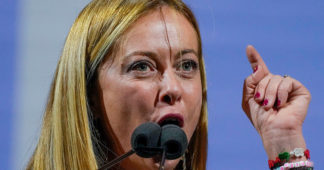By Marina Catucci
Sep 29, 2022
BOLOGNA, Italy — The first woman to hold the office of prime minister in Italy is a fascist. This is not hyperbole or metaphor, or some headline-grabbing device used to smear a conservative. No. The fact is that Giorgia Meloni, leader of the largest party after Italy’s recent elections, is fascist to her core. The old-fashioned, last-century, Roman salute-in-public kind of fascist.
This fact is clear enough in Italy, even if Meloni, in order neither to admit nor deny that she is a fascist, performs semantic acrobatics, such as stating that fascism is now “consigned to history.” Whatever that is supposed to mean.
I watched this disaster unfold here in the center of northern Italy, one of the nation’s leftist strongholds. There was a resigned awareness creeping through the city, a feeling that we were about to experience an occupation.
Meloni entered politics at age 15 as an activist in the youth section of the Movimento Sociale Italiano or MSI, a party created in 1946 by veterans of the Italian Social Republic as a home for those nostalgic for the defeated Fascist regime. Its founder, Giorgio Almirante, an editor at the pseudoscientific racist journal La Difesa della Razza during the Mussolini dictatorship, never disavowed his political beliefs.
Giorgia Meloni joined the party’s youth section, Azione Giovani (Youth Action), first as a militant member and then as a leader. From the beginning, she identified herself with the most fervently nationalistic stream in that movement. She closely adhered to the path of classical Roman fascism, the same path taken in the 1970s by young neofascist hooligans known as “sluggers,” who interacted with unionists and communists using iron bars.
The section of Azione Giovani that kept the young Meloni busy handing out leaflets, posting bills and organizing assemblies was known as the most active in Rome, in the neighborhood called Colle Oppio, a stone’s throw from the Colosseum. That area is still the main outpost of the far right in Italy’s capital. For a Roman to say, “I’m from Colle Oppio” still speaks volumes.
In 2004 she was elected president of Azione Giovani, becoming the first female president of a right-wing youth organization. Perhaps we should have understood where she was going. Her career continued in Alleanza Nazionale (National Alliance), the right-wing party that evolved from the MSI. In 2011, after the dissolution of Polo delle Libertà, the coalition led by three-time prime minister Silvio Berlusconi — which Alleanza Nazionale had joined — she co-founded a new party, Fratelli d’Italia (Brothers of Italy), whose agenda is rooted in populist positions found all over the European far right, including skepticism (if not outright hostility) toward the EU and hard-line opposition to immigration.
Also joining Fratelli d’Italia was Meloni’s old friend Ignazio La Russa, who proudly said that in their party, “We are all heirs of Il Duce.” Meloni hasn’t exactly said that; her public statements lean into bromides about God, fatherland and family. She has called abortion a “tragedy” and is openly hostile toward expanded LGBTQ rights, threatening to place same-sex unions — legal in Italy since 2016 — under review. She opposes adoption by same-sex couples, as well as by unmarried or single people. Since her days as president of Youth Action, she has waged battles against the abortion pill, same-sex civil union bills, cannabis legalization and expedited divorce proceedings.
Meloni’s old friend Ignazio La Russa, who helped found Fratelli d’Italia in 2011, proudly said that in their party, “We are all heirs of Il Duce.”
In last Sunday’s national election, Fratelli d’Italia received nearly three times the vote of Lega Nord (known in English as the League), which, along with Forza Italia, is expected to join the far-right coalition government led by Meloni. Lega is led by the overtly racist and xenophobic Matteo Salvini, while Forza Italia is the resurrected remnant of the once-formidable party led by the immovable Silvio Berlusconi, who at age 85 resembles a plastic-surgery-enhanced caricature of himself.
Meloni’s jobs plan is focused on tax cuts for business owners who hire new workers, but she opposes introducing a minimum wage and has promised to drop the “Citizens Income,” a sort of social welfare that provides a conditional and non-individual guaranteed minimum income. She has talked instead about vague alternatives that would aid those who “cannot work,” but would exclude “potential workers sitting on the sofa.”
Her entire program is less a coherent set of policies than a bunch of populist slogans that play to the well-known feelings of insecurity of both the struggling middle class and the hitherto dominant class of middle-aged white males who feel increasingly threatened and destabilized in a multicultural and globalized society world. If some of that sounds distinctly familiar to Americans, it should.
That fringe group, in patriarchal and chauvinistic Italy, would certainly have preferred a male leader. Unfortunately for them, Salvini has proven time and again that he is simply too clueless to be an effective political leader. Meloni, it appears, can be just as macho as any man. She has exploited the sexist and boorish references to her surname, which translates literally as “melons” — and carries the same grade-school sexual innuendo and connotation as it does in English. (She posed for a TikTok video holding two cantaloupes in front of her chest.)
The political plan of Brothers of Italy and its allied isn’t much different from that of the extreme right everywhere: a permanent state of emergency, justified by inflammatory rhetoric; stoking fear against immigrants and refugees; endless descriptions of a country in shambles and social-moral decay. (“Italian Carnage” wouldn’t be far off the point.)
In her victory speech, Meloni sought to present herself as non-divisive, saying she wanted to lead the whole country and cares about the needs of all citizens. But holding Italy together under these conditions will not be an easy job, and her words of appeasement cannot be taken at face value.
Within a few days, this intermediate post-election phase will end, and the most right-wing Italian government since the death of Benito Mussolini will be formed. The House and Senate will seat large numbers of new fascists, who until now have only been names on the ballot, largely unknown to most of the public, but now set to form the most right-wing political army in Western Europe. It is through those new names and their programs that we will see the true face of Brothers of Italy.
While half of Italian society is toasting the victory of a previously unpalatable right-wing party, the other half is experiencing genuine political trauma. The first demonstrations in opposition to this government may bring violence back to the streets, where fascists and antifascists confronted each other with ferocity during the “porphyry years” of the 1970s, a reference to the Roman stones sometimes pulled from the ground and thrown at opponents.
But Meloni and Brothers of Italy did not descend from another planet; Italy, the nation that codified modern fascism, has chosen it once again.
While that happened, the Italian left largely stood and watched, immobilized in its pointless search for a nonexistent center. This pattern is not limited to Italy, but can be found everywhere in Europe where the hard right is rising. In Sweden, Spain and Portugal, for starters, far-right parties have made remarkable gains.
One dark possibility is that under Meloni, Italy will seek to form an axis with Hungary and Poland on a number of key issues, starting with those related to the rule of law. Polish Prime Minister Mateusz Morawiecki exulted in Meloni’s victory, and a congratulatory tweet from Balázs Orbán, a key adviser to Hungarian leader Viktor Orbán, explicitly called for such an axis: “In these difficult times, we need more than ever friends who share a common vision and approach to the challenges of Europe.” The leader of Spain’s Vox party, Santiago Abascal, chimed in: “Tonight millions of Europeans are pinning their hopes on Italy. Giorgia Meloni has shown the way for a proud, free Europe of sovereign nations.”
Within this framework, paradoxically, the United States in recent years seems to have discovered the possibilities of socialism, whether known by that name or not. Discarded and repudiated on the continent of its birth, the socialist idea may yet grow back in the so-called New World, where until recently it has never borne fruit. Or at least this is what Europeans must hope for in this dark moment.
We remind our readers that publication of articles on our site does not mean that we agree with what is written. Our policy is to publish anything which we consider of interest, so as to assist our readers in forming their opinions. Sometimes we even publish articles with which we totally disagree, since we believe it is important for our readers to be informed on as wide a spectrum of views as possible.











